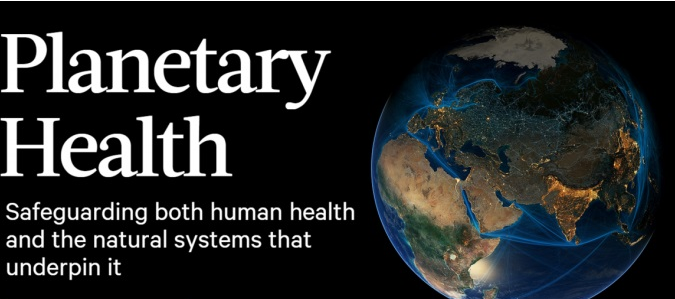New Report Calls for Policy Reforms to Achieve Planetary and Human Health
Discussion details

Changing environmental conditions such as increased carbon dioxide emissions, rampant use of fertilizer and the acidification of the oceans could lead to major health challenges for millions of people, according to a new report launched today in Nairobi.
FURTHER RESOURCES
The Rockefeller Foundation-Lancet Commission on Planetary Health report, Safeguarding Human Health in the Anthropocene Epoch, establishes clear linkages between planetary and human health. The report explains that the health and well-being of future generations is being jeopardized by the unprecedented degradation of natural resources and ecological systems.
An increasing population, unsustainable consumption and production and the over-exploitation of natural resources are straining the planet's resources and having an impact on human health. In Africa in particular, the prospects of increasing environmental degradation will only expose further social and economic inequities often associated with health indicators. Poverty increases risks attributable to environmental change through increased sensitivity and exposure to pollutants and disasters.
"Our studies have shown that up to 60% of Kenya's urban residents live in slums and slum settings," said Dr. Alex Ezeh, the executive director of the African Population and Health Research Center, and one of 15 commissioners from eight countries involved in the development of the report.
"Population control policies need to be strengthened in Africa to be able to address the existing burden of disease and to avoid having more health problems that could arise from further changes in the environment. It is impossible to deal with Africa's growth and poverty challenges without managing urbanization," added Dr. Ezeh.
Dr. Richard Horton, the editor-in-chief of the Lancet and another co-author of the report added: "This Commission aims to put the health of human civilizations, and their special relationship with the larger biosphere, at the centre of concerns for future planetary sustainability. Our civilization may seem strong and resilient, but history tells us that our societies are fragile and vulnerable."
Planetary health offers an unprecedented opportunity for advocacy to support global and national reforms of taxes and subsidies for many sectors of the economy, including energy, agriculture, water, fisheries, and health. Regional trade treaties should act to further incorporate the protection of health in the near and long term. Several essential steps need to be taken to transform the economy to support planetary health.
"We have reached a point where environmental degradation poses serious threats to human health. By exploiting the environment unsustainably, we are compromising the health of our planet and of future generations. A sustainable approach to economic development, and consumption and production can promote a healthier planet and population." said Achim Steiner, executive director of the United Nations Environment Programme (UNEP).
"We are on the verge of triggering irreversible global effects. Numerous environmental changes - which include, but extend far beyond climate change - threaten the gains in health that have been achieved over recent decades and increase the risks to health arising from major challenges as diverse as under-nutrition and food insecurity, freshwater shortages, emerging infectious diseases, and extreme weather events," added Mwihaki Kimura Muraguri, the senior associate director of the Africa Regional Office of the Rockefeller Foundation.
The East Africa region must engage in discussions on shared priorities, and shared action, to combat the effect of planetary degradation and environmental ill-health. Governments and development partners must lead the review of resource use policies, address capacity to respond to the health consequences of environmental change and fully integrate these issues into health budgeting and financing.
For more information or to schedule interviews, please contact Daniel Adero on telephone +254 20 400 1112 or email dadero@aphrc.org
About the RF-Lancet Commission on Planetary Health
The Rockefeller Foundation and The Lancet joined forces in 2014 to form the Commission on Planetary Health and to review the scientific basis for linking human health to the underlying integrity of Earth's natural system. Alex Ezeh is one of the Lancet Commissioners. For a full list of Commissioners, visit: http://www.rockefellerfoundation.org/planetary-health
Log in with your EU Login account to post or comment on the platform.